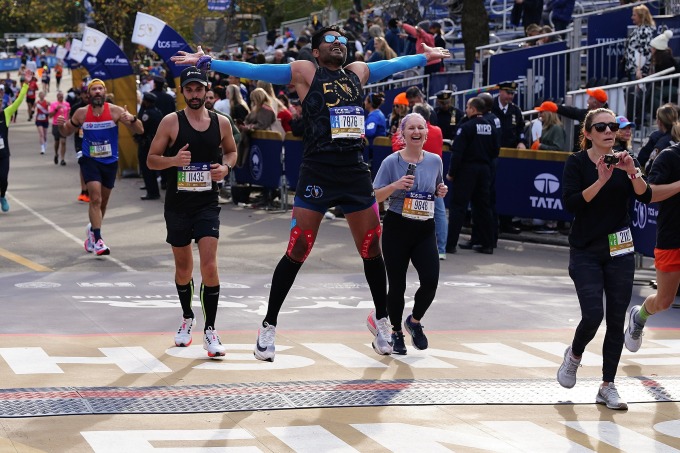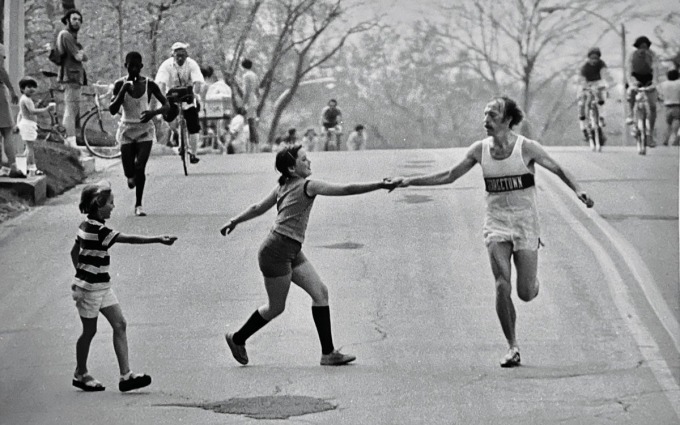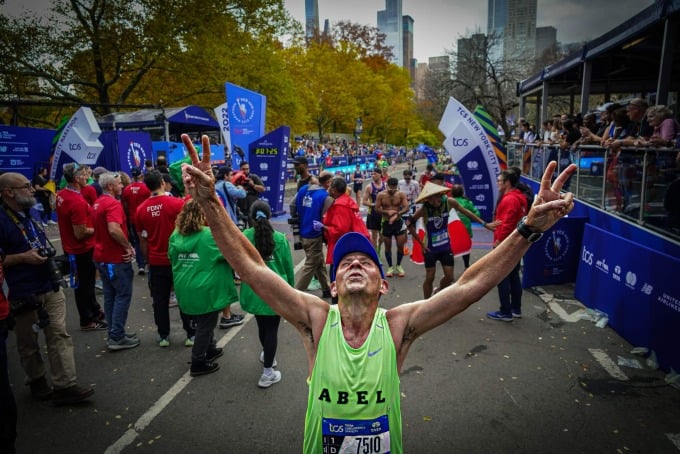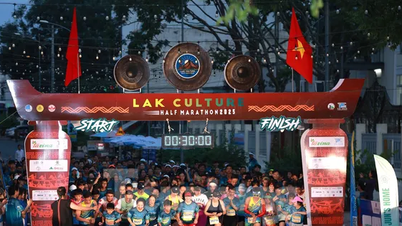After a long time of training and then putting in the effort when entering a marathon, runners tend to feel bored, empty and reluctant to practice.

Runners at the finish line at the 2021 New York City Marathon. Photo: Reuters
Returning from her first world marathon title in 1983, Grete Waitz said she felt “as empty and meaningless as the tunnel.” The feeling even began as Waitz walked through the tunnel to leave the stadium. Joan Benoit, the first Olympic women’s marathon champion, winning gold in Los Angeles in 1984, wrote in her memoir that she felt empty after big races, and sometimes couldn’t shake the bad mood for weeks.
This post-race malaise may be one of the few things most amateur runners have in common with elite athletes.
But according to Podium Runner , if you feel unsettled after a marathon, you’re not alone, you’re not crazy, and you don’t need to hide it. In fact, admitting how you feel can be constructive. Mark Coogan, coach of the New Balance Boston running team, sees a positive trend in recognizing that “athletes are not robots, they’re human beings”—acknowledging that, regardless of your ability level, running and competing is hard, and not just physically.
Great obsession
“I always have a major crash after a marathon,” says Ben Rosario, coach of the HOKA NAZ Elite running team. Rosario sees the lack of a specific goal after months of hard training as a major problem. “There’s an addictive quality to marathon training. You’ve spent months working on it, and it motivates you to get up in the morning, to try to train. And then it’s gone,” he says.
Amy Begley, a former 2008 Olympian and coach of the Atlanta Track Club, agrees with Rosario, comparing finishing a marathon to “coming down from an incredible height.” “There’s a black hole that you come back from, and a lot of people don’t understand,” she adds. “People say you should be happy and excited.” Sometimes you feel that way, other times less so. And that feeling doesn’t necessarily have to do with the marathon result or performance.
Expectations and reality
You may feel worse after winning races. Marathon champion Jack Fultz, now a sports psychologist and running coach, recalls that of all the marathons he ran, he felt the “most profound” disappointment after winning Boston in 1976.

Jack Fultz (right) on the Boston Marathon course in 1976.
Fultz says expectations—how we think we should feel—often exceed reality. We end up feeling like something is wrong with us because we aren't as happy as we imagined we would be after achieving our expected goals.
It doesn’t have to be a marathon, but it can happen after the biggest successes. Five-time Olympic runner Nick Willis recalls feeling most lost after winning 1,500m medals in 2008 and 2016. “It was much harder to get back into anything,” he says. “I kind of drifted away for a few months before I got back into anything serious.”
Neurological changes
“Neurochemical issues may also play a role. We don’t know much about how marathon running affects the brain, but we do know that it takes some time for the brain to reset,” Podium Runner writes .
Exercise increases levels of mood-affecting chemicals in the brain, which means you may feel better after a run. But for most runners, a marathon is more than just a workout. It’s long, intense, and for most runners, the culmination of a long journey toward a personally meaningful goal.
A mood-influencing chemical, dopamine, is closely linked to goal pursuit: if you're taking steps to achieve a set goal, your body releases more dopamine to make you feel good about it.
Marathon training releases dopamine, and the race itself causes the spike. But once you reach your goal, you lose that particular dopamine rush. The more meaningful the goal, the harder it can be to crash and the harder it is to refocus.
The researchers found that another factor that affects mood—brain-derived neurotrophic factor (BDNF)—dropped below baseline three days after the marathon. However, the same researchers found that, on average, the marathon runners’ moods were still improving three days after the race. Additionally, “Changes in BDNF take longer to affect mood,” said Astrid Roeh, a member of the study team.
Your brain activity hasn't yet stabilized, but it seems reasonable to assume that post-race emotional letdown might have the same cause as physical soreness: Your body is repairing the stress of the marathon effort.

An excited runner after completing the 2023 New York City Marathon on November 6. Photo: amNewYork Metro
Rest
The causes of emotional disappointment are complex, so there's no simple solution to overcoming it. The general advice is to set a different goal. Benoit wrote in her memoir that she often focused on the next big race as quickly as possible, but that often didn't help much.
It might be best to take some time off. “Be careful about signing up for another race or jumping back into training too quickly,” says sports psychologist Justin Ross. “That just becomes a hopscotch in terms of processing what you just did.”
Professional trainers agree. “People who try to come back right away are going to have bigger problems,” says Begley. “You need a break.” Coogan agrees, adding: “Do the things you haven’t been able to do. Have fun, try to be normal.” Rosario recommends going to Disneyland: “Get away from the running world, pamper yourself. Give yourself time to let that excitement come back naturally.”
But that's not always easy, and it can cause problems. "We still have goals and dreams, so it's absurd to say don't think about them," says Amy Cragg, a former two-time Olympian and coach in Chapel Hill, North Carolina. Taking a break can make you feel like you're letting yourself go and your goals are getting further out of reach.
Instead of trying not to think about running goals, try expanding your focus to non-running goals, suggests Loretta Breunig, Ph.D., author of "Habits of a Happy Brain" and a frequent blogger for Psychology Today. "Variety stimulates dopamine," she says, cautioning that new goals should give you a sense of pride.
Runners find meaning in running, but they don't necessarily think about it all the time. "Pay attention to other aspects of your life," suggests Stephanie Roth-Goldberg, sports psychotherapist and founder of Intuitive Psychotherapy.
Staying active is important with any strategy, and not just because it will help you feel like you’re still making some progress toward your personal goals. If there’s a neurochemical reason you’re feeling bored, like your brain getting used to exercise, then you should find a way to counteract that: go for a run if your body is up to it, go for a bike ride, swim, walk, or hang out with friends.
Don't overemphasize running
Keeping your race in perspective can help you feel less lost after a marathon. “Try to focus on what’s really important,” says Jonathan Green, coach of Olympic bronze medalist Molly Seidel. “Races are special and you should really try to enjoy them while you’re doing them, but running is just your left leg, your right leg, and there are bigger things out there.”
Roth-Goldberg says it's easy for runners to overestimate the importance of running. "They underestimate other aspects of their lives," she says. Runners need to be reminded that running isn't everything. "Running can be a big part of your life, but it doesn't define you," Rosario says. "If you think everything will change because of how you run, you're wrong."
Sometimes you need to be reminded that personal worth goes beyond running. Rosario likes to quote his student Scott Fauble: "Your dog doesn't know you ran a marathon."
It’s a valuable reminder even for pros like Fauble, the best American finisher at the 2019 Boston Marathon, and even more important for amateur runners who run for fun and personal goals: Be what your dog thinks you are, more than a marathon runner.
Collective
Marathon running is not a solitary experience, and athletes often lack the camaraderie of training. “People often don’t realize that there’s a social component to training,” Roth-Goldberg says.
After a marathon, runners may need to lean on loved ones, family, or friends. “Supportive people, like family, spouses, coaches, need to be there,” Begley says. But be patient if they don’t understand why the thing that’s bothering you isn’t making you happy.
If runners are really stuck after a big race, Begley encourages them to volunteer at a track club practice or event, or to pace a running group or help a friend train. Begley sees these “race-enabling activities” as helping runners get out of their own heads and consider why they run. “Thinking about helping others can help you discover something new,” she says.

A pacer at the 2023 New York City Marathon. Photo: New York Road Runners
Breuning emphasizes that no solution is guaranteed to work, and that the ups and downs you experience after a marathon are part of what makes you who you are. You may find yourself in a dark place after a marathon. If so, remember that it’s not a sign of mental weakness—any more than being unable to walk down a flight of stairs after a marathon is a sign of physical weakness. Both are signs of hard work and honest effort.
Give yourself time to heal both physically and mentally. If your mood seems particularly low or difficult to change, consider seeing a therapist, just as you would seek medical help for a lingering injury.
Cragg was prepared for that disappointment after Rio 2016. "I still feel lost, but I'm OK with that," she says. Willis says the same about her post-Olympic mood, noting that "you tend to feel most alive when you're passionately working towards a goal."
“And that’s probably how all runners are connected, as they all strive to move forward,” Podium Runner notes. “The fact that runners seek out the challenge of a marathon suggests that it’s all about setting a goal and pursuing it with all your heart. If you then have to wander in the emotional desert for a while, that may be the price you have to pay to reach the promised land again.”
Hong Duy (according to Podium Runner )
Source link





























































































![[OCOP REVIEW] Bay Quyen sticky rice cake: A hometown specialty that has reached new heights thanks to its brand reputation](https://vphoto.vietnam.vn/thumb/402x226/vietnam/resource/IMAGE/2025/7/3/1a7e35c028bf46199ee1ec6b3ba0069e)













Comment (0)